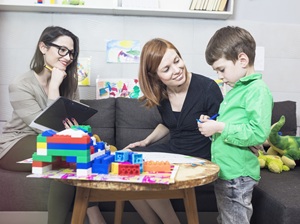 If you’ve ever felt called to help kids or teens work through life’s challenges, you’re not alone. Childhood and adolescence are full of big emotions, confusing transitions, and sometimes really tough situations. Having a supportive, understanding adult to talk to can make a huge difference.
If you’ve ever felt called to help kids or teens work through life’s challenges, you’re not alone. Childhood and adolescence are full of big emotions, confusing transitions, and sometimes really tough situations. Having a supportive, understanding adult to talk to can make a huge difference.
Maybe you’ve seen how mental health issues affect young people in your community. Perhaps younger family members or friends already turn to you when they need to talk. Whatever’s drawing you to this path, becoming a counselor for children and adolescents can be deeply meaningful.
So, how do you actually do it? Let’s walk through the steps, the skills you’ll need, and what you can expect on the job.
What Does a Child or Adolescent Counselor Do?
Child and adolescent counselors help young people deal with emotional, behavioral, and psychological issues. Some days, you're working with a child experiencing anxiety about school. Other days, you might support a teen struggling with identity, depression, or family conflict. You might meet with children one-on-one, include their families in sessions, or work with teachers and school staff. No matter what, you’re there to listen to clients’ experiences and emotions without judgment and to help them develop healthy coping strategies.
Common reasons young clients come to counseling include:
- Anxiety, depression, or mood disorders
- Bullying or social struggles
- Family problems or divorce
- Trauma or abuse
- School stress or academic pressure
- Grief or loss
- Behavioral issues or ADHD
Being a mental health counselor for kids and teens is challenging, but also incredibly rewarding. Seeing a young person overcome their struggles and grow more confident, resilient, or emotionally aware is a powerful thing.
What Makes a Great Counselor for Kids and Teens?
All counselors need certain skills and abilities. These include the following ethical standards: maintaining clear boundaries and being sensitive to the diverse backgrounds of your clients. Another must is being a good communicator. With kids, you’ll need to listen well and use age-appropriate language. You’ll also have to be good at engaging with both clients and caregivers.
To help young clients, you’ll need to know how to build trust and meet them at their level. Sometimes, you’ll have to get creative to really connect and find the right solution. No two clients or sessions will be the same. You’ll want to tailor your approach to the child’s age, personality, and needs. When words aren’t enough, play therapy, art, and storytelling can help kids express themselves.
In many cases, clients are facing complex issues. Achieving results will take patience. Progress can be slow, but kids need time and consistency. Empathy and warmth are also essential. Young people can tell when you genuinely care. Finally, counselors must be emotionally resilient. This can be a tough field, so you’ll need strategies to help with managing the emotional demands of your work.
How to Get Started
If you’re serious about becoming a mental health counselor for kids and teens, there’s a clear path to follow, but it takes time and commitment. Here’s a step-by-step overview.
1. Start with a Bachelor’s Degree
Start by earning a bachelor's degree in psychology or a related field. This foundational education introduces you to critical concepts in human development, behavioral health, social psychology, and more.
2. Earn a Master’s Degree
Next comes a master’s degree in a mental health field—such as the Master of Arts in Clinical Mental Health Counseling program at South University.* These programs should include classroom learning and hands-on training in the field. Expect to dive into topics like ethics, family systems, clinical assessment, childhood and adolescent behavioral disorders, and therapeutic techniques.
3. Complete Your Clinical Hours
To become licensed, you’ll be required to complete supervised clinical hours. (The exact amount will depend on your state.) During this time, you’ll work with real clients, often in schools, clinics, or counseling centers, under the guidance of a licensed counselor. It’s a crucial step in building your skills and confidence.
4. Get Licensed
Before you start working as a mental health counselor, you’ll need to pass a national certification exam and meet your state’s requirements for licensure*.
Job Outlook and Opportunities
According to the Bureau of Labor Statistics, counselors focusing on behavioral disorders and mental health are part of a growing field. Once you’re a licensed counselor, you can pursue work in schools, private practice, hospitals, nonprofits, juvenile correctional facilities, and community mental health agencies, including youth shelters and programs for at-risk youth. Some counselors also specialize in play therapy, trauma, behavioral therapy, or another area. (Doing so may require additional education or certification.)
Getting Started on Your Future
Becoming a counselor for children and adolescents is a chance to help shape someone’s life at a critical time. You won’t have all the answers, and some days will be rough. But when a child opens up, starts to heal, or begins to believe in themselves again? Those moments make it all worth it.
If you feel learning to become a trusted guide for kids and teens through their ups and downs is a fit for you, this career could be exactly what you’re meant to do—and South University could help you get started. Learn about our Counseling and Psychology programs or request information to speak with our Admissions team about your goals.*
-
*Graduates are required to pass the national certification exam and obtain a state license in order to work in the field. (Exam names vary by program.) Please refer to the State Professional Licensure Determination and National Certification/Licensure section of the University catalog for additional information. South University cannot guarantee each graduate will pass the required licensure examinations. South University does not promise or guarantee licensure, employment or salary amounts.




